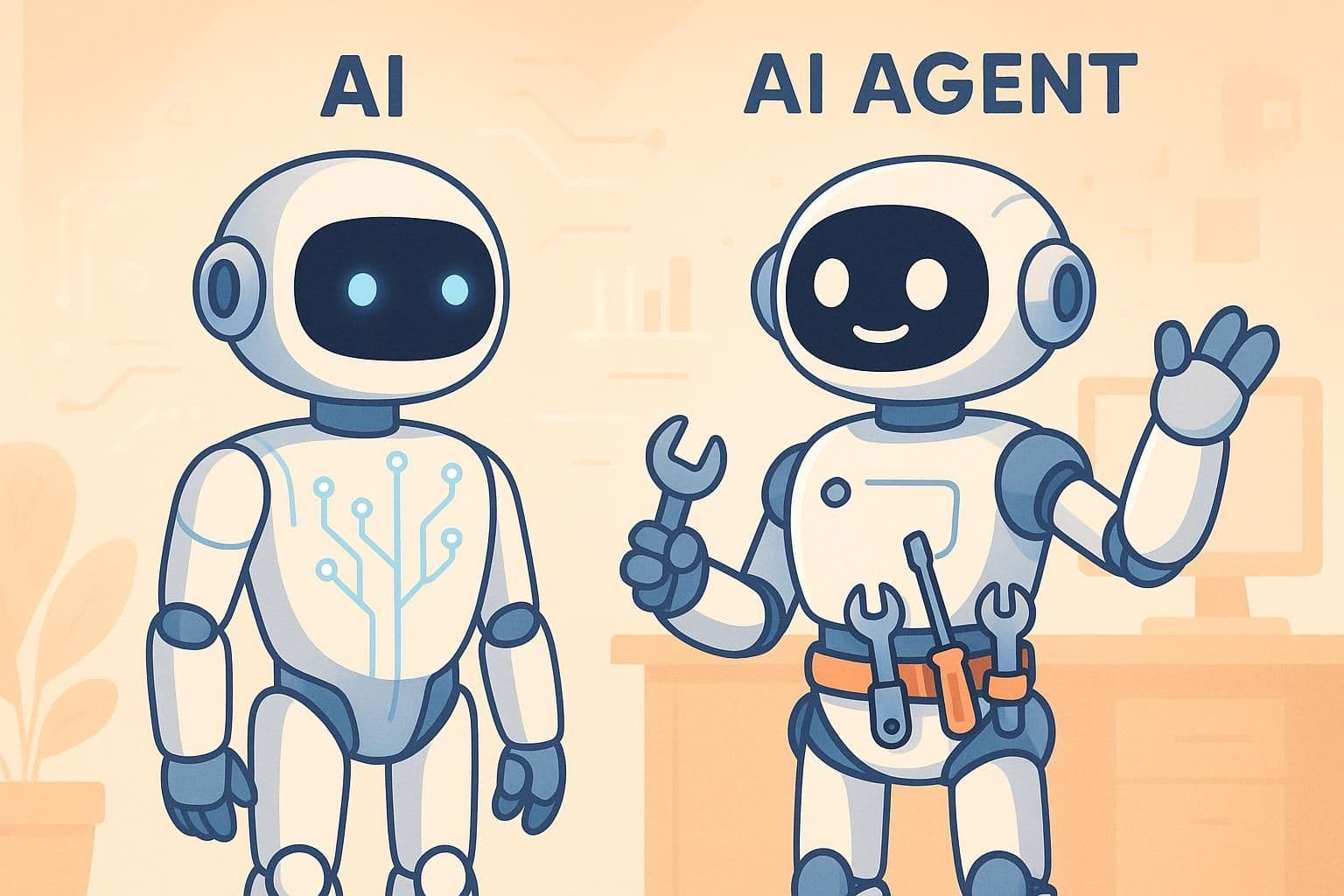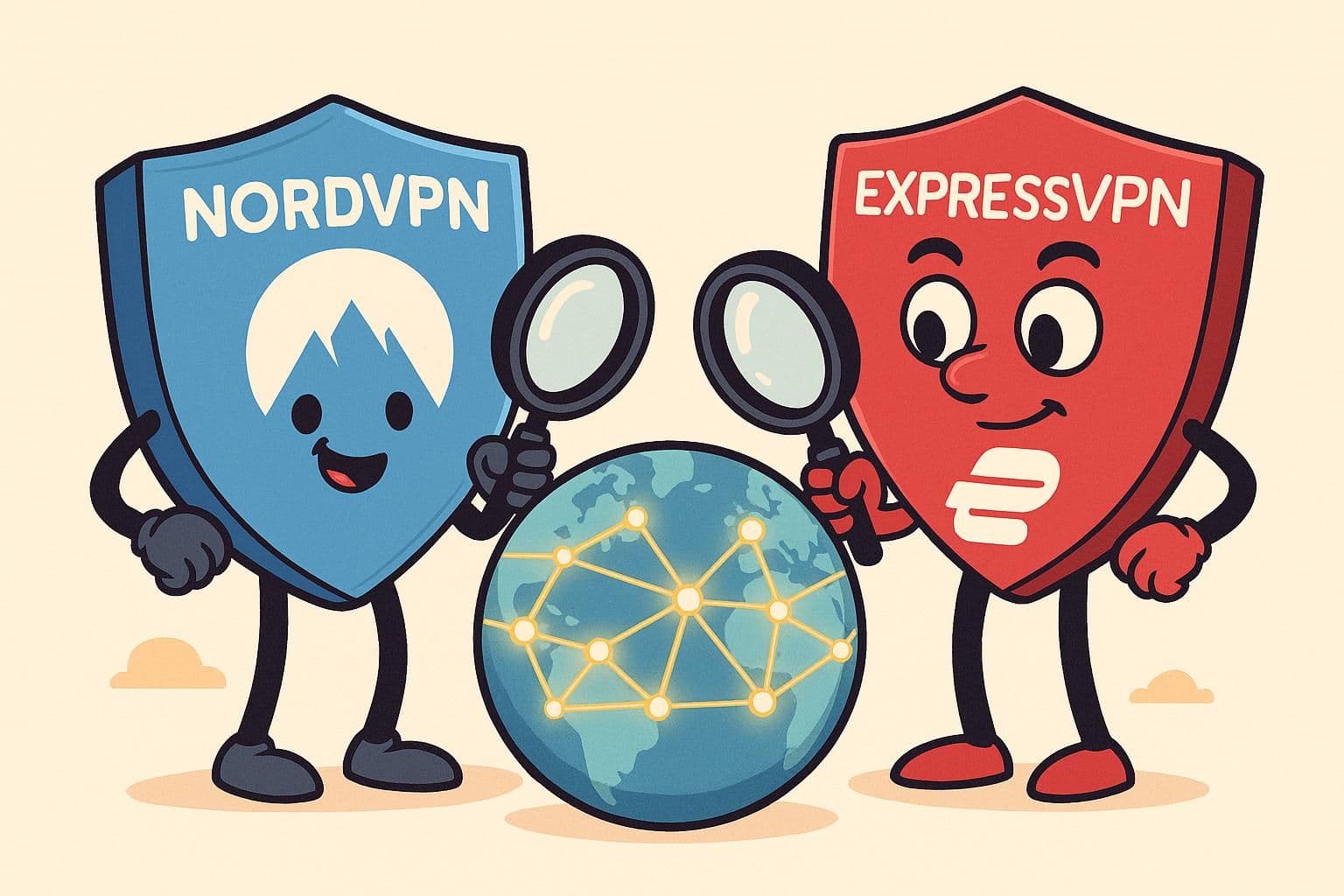AI vs AI Agent: Understanding Differences in Intelligent Technologies
Explore the distinction between AI and AI agents and learn how they enhance decision-making and automate workflows across various industries.

AI systems can analyze data and respond to prompts, but AI agents take it a step further - they plan, execute, and adapt tasks independently. This article breaks down the key differences between AI and AI agents, focusing on how these technologies handle tasks, make decisions, and integrate into workflows.
Here’s what you’ll learn:
- AI: Processes single prompts, analyzes data, and lacks memory.
- AI Agents: Manage multi-step tasks, retain context, and adapt in real time.
- How AI agents automate workflows like customer support and inventory management.
- Why tools like Latenode simplify deploying AI agents with low-code platforms.
| Aspect | AI | AI Agents |
|---|---|---|
| Task Handling | Single-turn responses | Multi-step, context-aware processes |
| Memory | None | Retains past interactions |
| Decision-Making | Pre-trained data patterns | Real-time, adaptive |
| Integration | Limited tools | Connects with APIs and external tools |
AI agents are transforming workflows by automating complex, dynamic tasks. Let’s explore how they work and why they matter.
AI Models vs AI Agents
What is AI?
Artificial Intelligence (AI) refers to computer systems designed to perform tasks that typically require human intelligence. Unlike traditional automation, which operates on predefined rules, AI systems analyze data, identify patterns, and adjust their responses based on new information.
Core AI Capabilities
AI is particularly strong in recognizing patterns, analyzing data, and making informed decisions. Using advanced algorithms, these systems process large datasets to uncover trends and insights that might go unnoticed by humans. Key capabilities of modern AI include:
- Understanding natural language for tasks like chatbots or voice assistants.
- Analyzing visual data through computer vision, such as identifying objects in images.
- Making predictions by evaluating historical data and spotting trends.
- Learning and improving over time through iterative processes.
These abilities are essential for enabling the more advanced and autonomous operations seen in AI agents, which will be explored further.
How Companies Use AI Today
Businesses across industries are using AI to improve efficiency and make better decisions. For example:
- Healthcare: AI aids in diagnosing conditions and analyzing medical images.
- Finance: Systems detect fraudulent activities and assess risks.
- Manufacturing: AI ensures quality control and monitors equipment performance.
- Retail: It helps manage inventory and personalize customer experiences.
Companies are moving beyond basic uses of AI to address more complex challenges. Today’s AI platforms handle diverse tasks, such as resolving customer queries and optimizing supply chains, proving their effectiveness in solving practical business problems.
What sets AI apart from traditional software is its ability to:
- Learn from ongoing data and experiences.
- Adjust responses based on the specific context.
- Process unstructured and complex information.
- Make decisions even with incomplete information.
This flexibility makes AI a powerful tool for handling intricate tasks, laying the groundwork for specialized AI agents to further streamline business processes.
AI Agents Explained
AI agents are designed to work independently on tasks, focusing on achieving specific goals rather than just analyzing data like traditional AI models do [2]. They combine perception, decision-making, and action into a single, cohesive process.
Core AI Agent Functions
AI agents continuously monitor inputs, process real-time data, and respond accordingly. Their main functions include:
- Collecting data from their surroundings using sensors
- Making decisions based on predefined rules and algorithms
- Taking actions through connected systems
- Learning from results to improve future performance
Take e-commerce as an example: AI agents can study customer behavior to fine-tune product recommendations, manage inventory levels, and streamline logistics [3]. These abilities are made possible by the key components outlined below.
AI Agent Components
AI agents rely on several critical components to function effectively:
- Perception System
This system collects data from various inputs to understand the environment. For instance, in manufacturing, sensors track equipment performance to predict and prevent breakdowns [3]. - Decision-Making System
Using advanced algorithms and pre-set rules, this system processes the gathered data to make informed choices. For example, it might analyze customer inquiries and select the most appropriate response based on past interactions [3]. - Action System
Once decisions are made, this system carries them out. In financial services, this might involve flagging suspicious transactions and activating security measures to address potential fraud [3]. - Learning Element
This component allows the AI agent to improve over time by learning from its actions and outcomes. For example, as AI agents become more advanced, the market for them is projected to grow significantly, from $5.1 billion in 2024 to $47.1 billion by 2030 [3].
AI agents are highly effective for both routine tasks and complex decision-making. Their ability to adjust actions based on environmental data makes them an essential tool for automating business processes efficiently.
AI vs AI Agents: Key Differences
Grasping the difference between AI and AI agents is essential for using intelligent technologies effectively. The distinction lies in how they handle tasks: one focuses on single-input responses, while the other manages context-aware, multi-step processes. This difference shapes their business applications.
How They Make Decisions
Traditional AI models operate by processing input based on pre-trained data, delivering responses to specific prompts. AI agents, on the other hand, go a step further by executing tasks that require multiple steps, using real-time data and retaining context throughout.
| Aspect | Traditional AI | AI Agents |
|---|---|---|
| Input Processing | Responds to single prompts | Handles multi-step tasks with contextual memory |
| Memory | Lacks long-term memory | Retains past interactions and learns over time |
| Decision Framework | Based on pre-trained data patterns | Adapts decisions in real time |
| Tool Usage | Limited to built-in capabilities | Connects with external tools and APIs |
For example, in customer support, a traditional AI model might answer a question based only on the current input. An AI agent, however, can access previous interactions, retrieve relevant data from databases, and handle complex tasks like updating records or scheduling follow-ups - all while keeping the context intact [1].
How They Work in Business
AI agents build on their ability to handle dynamic tasks, turning static processes into automated workflows. While traditional AI is effective for specific tasks like analyzing data or generating content, AI agents excel in scenarios requiring continuous adaptation and workflow management.
For instance, an AI agent could monitor inventory levels, communicate with supplier systems, and automatically reorder stock based on real-time updates [1].
Key operational differences include:
- Autonomous Functionality: AI agents work independently, integrating with APIs and maintaining context, unlike traditional AI, which focuses on isolated tasks.
- Real-Time Adjustments: AI agents adapt to new variables or changing conditions without needing retraining, whereas traditional AI often requires manual updates to handle new scenarios.
These features make AI agents particularly suited for dynamic business environments, where flexibility and real-time decision-making are essential.
sbb-itb-23997f1
AI Agents in Daily Work
AI agents are transforming how we manage tasks that were once handled manually. They don’t just replicate human actions - they streamline and improve everyday operations.
Business Process Examples
AI agents stand out by automating and optimizing routine tasks across various industries. Here’s a closer look at their practical applications:
Supply Chain Management
An AI agent tracks inventory levels, reviews historical trends, and automatically initiates reorders when stock dips below set thresholds. It keeps the entire supply chain in view, ensuring smooth communication and precise delivery tracking.
Customer Support Operations
AI agents efficiently manage customer inquiries by:
- Prioritizing and analyzing incoming requests
- Pulling up relevant customer histories and documents
- Crafting personalized responses
- Escalating complex issues to human agents
- Following up to confirm issue resolution
In high-pressure situations, these agents act quickly, offering solutions when timing is critical.
Quick Response Systems
AI agents shine in situations demanding immediate action based on live data. With tools like Latenode, they can quickly adjust inventory, pricing, and notifications based on market dynamics.
Reacting to Market Changes
AI agents monitor market trends and execute predefined strategies when specific triggers occur, such as:
- Adjusting inventory distribution
- Updating pricing models
- Tweaking marketing campaign settings
- Notifying team members of critical changes
Managing Time-Sensitive Tasks
In urgent scenarios, AI agents respond instantly by:
- Processing emergency maintenance requests
- Handling system alerts and notifications
- Coordinating rapid response teams
- Logging incident details in real time
Using Latenode's Platform
Latenode’s low-code platform simplifies the process of deploying AI agents, even for complex workflows.
Visual Workflow Creation
The platform offers a drag-and-drop interface to build AI agent workflows. Users can easily connect:
- Data input sources
- Logic for processing information
- Decision-making points
- Triggers for specific actions
- Handlers for responses
Integration Across Tools
Latenode supports interaction with over 300 applications and services, enabling seamless workflows across:
- Messaging platforms
- Databases
- Analytics tools
- External APIs
With its built-in database and headless browser features, Latenode allows AI agents to manage structured data and automate web-based tasks without additional software or complex coding. This all-in-one approach ensures AI agents can handle both simple and intricate processes while preserving accuracy and context throughout their operations.
Business Benefits of AI Agents
AI agents deliver measurable value to businesses in various sectors by improving performance and reducing costs.
Boosting Productivity
Organizations adopting AI agents often see notable improvements in their output:
Minimizing Errors While Increasing Accuracy
In supply chain operations, AI agents have reduced errors by 35% and improved efficiency by 25% [4]. These outcomes are driven by consistent task execution, adherence to quality standards, and the elimination of human mistakes in repetitive tasks.
Enhancing Healthcare Outcomes
Healthcare providers using AI agents have achieved a 25% improvement in diagnosis accuracy. By combining historical patient data with real-time insights, these tools help deliver better patient care and lower liability risks [4].
Optimizing Manufacturing Processes
In manufacturing, AI agents contribute to a 20–30% boost in production efficiency. This is achieved through predictive maintenance, real-time adjustments, and optimized scheduling, ensuring smoother operations and less downtime [4].
Cutting Costs and Driving Revenue
The financial advantages of AI agents are clear, with businesses reporting an average 30% reduction in operational expenses [4]. These savings and revenue gains come from several areas:
Lowering Operational Costs
AI agents reduce expenses by automating customer service, managing inventory more effectively, cutting down on manual processing, and minimizing errors.
Increasing Revenue
AI agents also help businesses grow their income:
- Travel and hospitality industries report a 10% revenue increase through dynamic pricing systems [4].
- Retailers experience a 25% rise in average order value using AI-driven product recommendations [4].
- E-commerce platforms see higher conversion rates thanks to personalized browsing experiences [4].
Enabling Round-the-Clock Operations
AI agents allow businesses to operate 24/7 without the expenses tied to staffing overnight shifts. For example, payment platforms like PayPal rely on AI to monitor millions of transactions every second, detecting fraud instantly [4]. This constant vigilance reduces fraud-related losses, ensures rapid responses to security threats, maintains consistent service quality, and significantly lowers staffing costs.
Latenode’s low-code platform enhances these advantages by simplifying automation processes while giving businesses full control. With its built-in database and extensive integration options, Latenode ensures AI agents can access and process the data they need to deliver these benefits efficiently.
Conclusion
Grasping the distinction between AI and AI agents is key to improving business workflows. While AI focuses on broad functions like analyzing data and recognizing patterns, AI agents are designed to handle specific tasks autonomously, addressing particular business needs.
By leveraging these tools, many organizations have seen improved efficiency and reduced costs by automating repetitive tasks. Platforms like Latenode simplify this process by enabling businesses to automate complex operations - such as 24/7 intelligent customer service - without requiring advanced technical expertise.
With its built-in database and integration features, Latenode ensures reliable performance across automated workflows. This setup helps convert manual tasks into efficient, intelligent processes that deliver clear, actionable results.
FAQs
What’s the difference between AI and AI agents when it comes to completing tasks and making decisions?
AI and AI agents differ significantly in how they handle tasks and make decisions. AI agents are specialized systems designed to autonomously perform multi-step tasks. They can break down complex objectives into smaller, manageable actions, adapt to changing inputs, and refine their performance over time using memory and learning capabilities. This makes them ideal for dynamic workflows and real-world problem-solving.
In contrast, traditional AI systems, like large language models (LLMs), are primarily focused on generating responses or outputs based on specific input prompts. While they excel at processing information and providing insights, they lack the ability to independently plan or execute tasks beyond their immediate scope. This distinction highlights the unique value of AI agents in automating and optimizing processes across various industries.
What are some real-world examples of how AI agents are used across industries to boost efficiency?
AI agents are transforming workflows across various industries by automating repetitive tasks and improving efficiency. For instance, in sales and marketing, AI agents can handle data extraction, lead enrichment, and personalized outreach, saving time and increasing lead generation. One company reported an 80% reduction in time spent on outreach tasks and a 62% boost in lead generation by leveraging AI agents to streamline these processes.
In addition, industries like customer service benefit from AI agents through automated support systems, such as chatbots that provide instant responses to common inquiries, reducing response times and enhancing customer satisfaction. These practical applications demonstrate how AI agents can help businesses achieve more with fewer resources while focusing on strategic priorities.
How does Latenode's low-code platform help integrate AI agents into business workflows?
Latenode's low-code platform simplifies the integration of AI agents into your workflows by offering an intuitive, step-by-step process. Users can easily add AI models, such as Anthropic's Claude 3, to automate tasks and enhance productivity.
The platform allows you to create custom scenarios by adding and configuring AI nodes tailored to your specific needs. This flexibility ensures seamless deployment of AI agents, enabling businesses to streamline operations and solve real-world challenges efficiently.
Related posts



